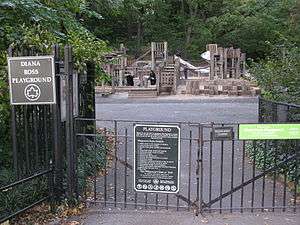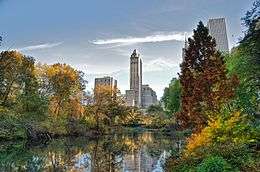Diana Ross Playground
The Diana Ross Playground is located in New York City's Central Park, inside the park at West 81st Street and Central Park West.

Context
Its namesake, the recording artist Diana Ross, who lives across the street in The Beresford, gave two legendary free concerts in Central Park on July 21 and 22, 1983 (attendance estimated to be between 400,000 and 800,000 people), and pledged to fund the project with proceeds from the television rights. However, when a thunderstorm during the first (and only scheduled) concert destroyed all of its memorabilia/merchandise, the performance did not prove profitable, and Ross used personal resources to fund the project.
In late 1983, Ross said she would pay for a playground in Central Park, at the site of the concert, with proceeds from the concert.[1]
Groundbreaking took place in September 1986, with both Ross and then-Mayor Ed Koch present. Ross reportedly called the event "one of the most fulfilling aspects of [her] life and career." [2]
Description
The playground is equipped with sturdy wood equipment, tire swings, a tube slide, a corkscrew slide, sandboxes, rope bridges, and a mushroom-style water feature. [3] Open daily from 7:30am to dusk, the space is maintained by the Central Park Conservancy's Playground Partners program.
To the north of the playground, the ground rises in a steep slope[4] to Summit Rock, the highest point in Central Park. To the east, secluded in shrub plantings, is Tanner's Spring, one of two natural springs that remain in the park (the other being Montayne's Spring at the Pool). Its name commemorates Dr. Henry S. Tanner, a proponent of therapeutic fasting, who, in the summer of 1880, elected to fast under constant observation for forty days and nights, supplied only by water from this spring.[5] M.M. Graff, in relating the story, observed "The legend quite naturally arose that the water of the spring contained some magically concentrated nutrients".[6] Before the construction of the park, the spring provided water for the community of Seneca Village, located to the north of Summit Hill, which at the time was called "Goat Hill".
In May 2012, after the Diana Ross: For One and For All DVD of the concert was released, DNAinfo.com called the playground as one of the "best playgrounds on the Upper West Side".[7]
References
- Carmody, Deirdre (1984-01-03). "CITY, AWAITING MONEY FOR A DIANA ROSS PLAYGROUND, IS TOLD THERE ISN'T ANY". The New York Times. Retrieved 2018-06-04.
- Anderson, Susan Heller and Deirdre Carmody (September 12, 1986). New York Day by Day; Start at Ross Playground, The New York Times.
- Central Park Conservancy, Diana Ross Playground Archived 2006-05-03 at the Wayback Machine. Retrieved June 23, 2006.
- A bronze plaque on a boulder along the path commemorates Elizabeth Barlow Rogers' decades of effort on behalf of Central Park.
- The fast lasted from 28 June to 6 August 1880, according to "The Pioneers of Therapeutic Fasting in America" Archived 2011-02-26 at the Wayback Machine.
- M.M. Graff, Tree Trails in Central Park (New York:Greensward Foundation) 1970:178.
- "Best Playgrounds on the Upper West Side". DNAinfo New York. Archived from the original on 2017-12-16. Retrieved 2018-06-04.


.jpg)